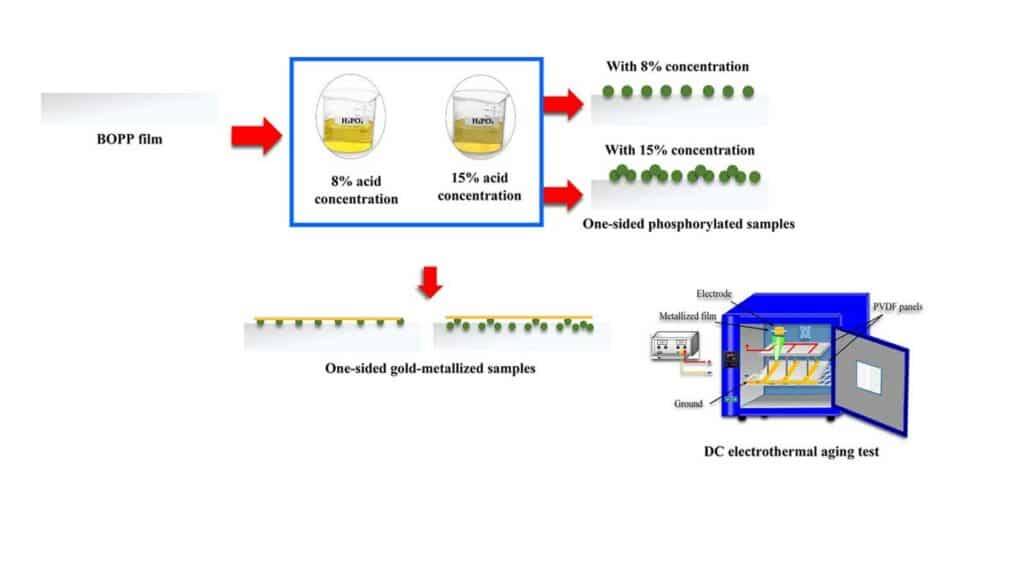Researchers from Iraq, China and UK published their study “Influence of Surface Chemical Modifications on Enhancing the Aging Behavior of Capacitor Biaxially-Oriented Polypropylene Thin Film” in Polymer Degradation and Stability journal.
Highlights
- •Polypropylene capacitors are susceptible to degradation in high electric fields and temperatures.
- •Phosphorylation improved biaxially-oriented polypropylene (BOPP) film’s electrical and mechanical properties
- •The properties of BOPP such as surface charge stability, thermal stability, mechanical integrity, relative permittivity, and aging behaviours have be enhanced
Abstract
Modern power electronic systems require appropriate metallized polypropylene film capacitors (MPCs) to operate in harsh environments. Due to their limited operating capabilities, commercial biaxially-oriented polypropylene (BOPP) films—the primary component of MPCs—are susceptible to degradation in high electric fields and at high temperatures.
In order to enhance the aging behavior of BOPP, this work proposes one-sided phosphorylation at optimum and excessive acid concentrations of 8% and 15% for 24 hours at a [high] temperature of 60°C. The proposed surface modifications’ success in enhancing the aging behaviors of BOPP is confirmed by DC electrothermal aging.
Field emission scanning electron microscopy (FE-SEM) analysis reveals changes in surface morphology resulting from phosphorylation. The changes in crystal structure of the original and phosphorylated samples are evaluated using X-ray diffraction (XRD). The average crystallite size, dislocation density, and microstrain during aging are also characterized using the Williamson-Hall (W-H) analysis method.
Fourier transform infrared (FTIR) spectroscopy is used to identify changes in the chemical composition and functional groups resulting from phosphorylation and aging, while X-ray photoelectron spectroscopy (XPS) is used to analyze changes in the surface chemical elements of the original, phosphorylated, and aged samples.
The charge-thermally stimulated discharge (C-TSD) technique and broadband dielectric spectroscopy (BDS) are used to verify the electrical performance. Mechanical properties, including thermal stability, are measured using the dynamic mechanical analysis (DMA) technique. The results indicated that the optimized phosphorylation improved the BOPP film’s electrical and mechanical properties.
As a result, the surface charge stability was found to increase under thermally stimulated discharge by 74% and the dielectric constant by 2%, while the dielectric losses decreased by 20.2%. Under aging, for the first time, the dielectric constant was found to increase by 4.8%, while dielectric losses decreased by 8.9%. In return, deformation resistance, ductility, and lower energy dissipation demonstrated enhanced mechanical performance.
Link to the scientific paper:
Haider M. Umran, Hasan F. Alesary, Hani K. Ismail, Feipeng Wang, Stephen Barton; “Influence of Surface Chemical Modifications on Enhancing the Aging Behavior of Capacitor Biaxially-Oriented Polypropylene Thin Film”; Polymer Degradation and Stability Journal,2024, 111105, ISSN 0141-3910,
https://doi.org/10.1016/j.polymdegradstab.2024.111105.
